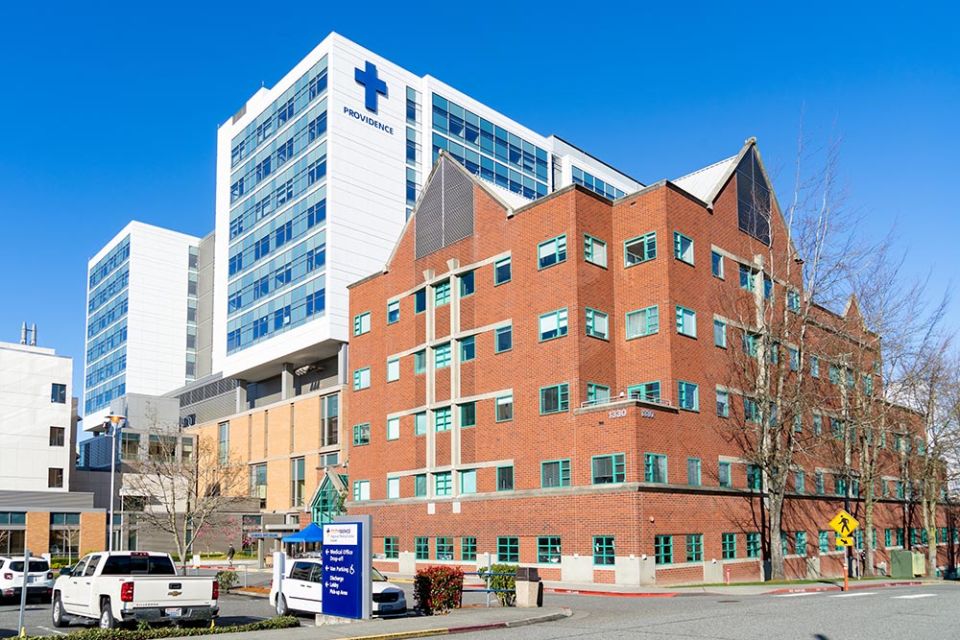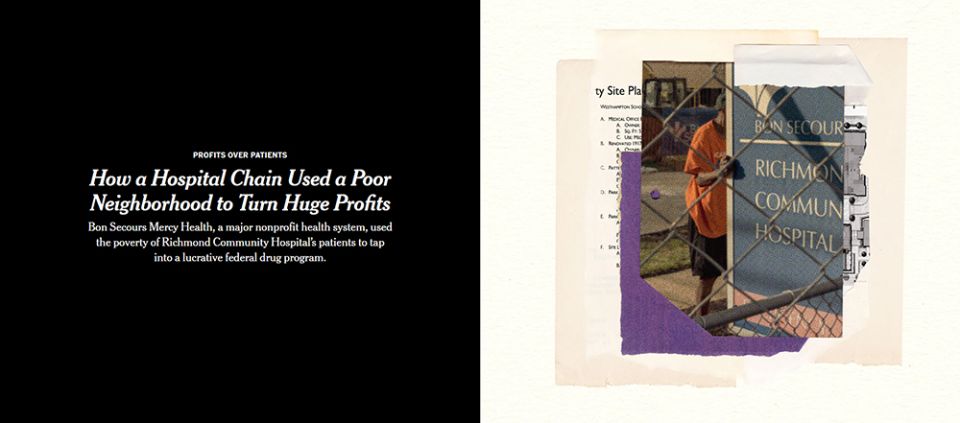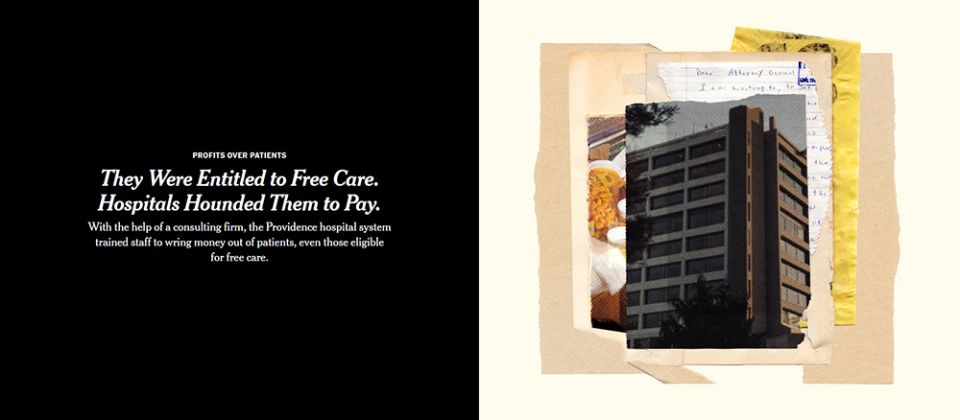dreamstime_xl_189844739 Providence hospital CROP.jpg

Two nonprofit U.S. hospital chains that have roots with sister congregations, Providence and Bon Secours Mercy Health, have responded to reporting by The New York Times that alleges that the two chains engaged in practices that took advantage of financially vulnerable patients.
The alleged practices include trying to collect money from low-income patients who qualified for free medical care and using a government prescription drug program to boost hospital profits.
In both cases, statements from the hospitals provided to Global Sisters Report on Sept. 27 said the Times reporting is unfair.
"The notion that Providence intentionally takes advantage of those who are vulnerable could not be further from the truth of who we are," Providence said in its emailed statement. "Serving those in need is the heart of our mission."
Bon Secours Mercy Health said in its statement: "To suggest that we don't operate in full support of our important mission is without merit and we take issue with such baseless allegations."
Both chains have roots with religious congregations — Providence with the Sisters of Providence and Bon Secours Mercy Health with the Sisters of Bon Secours, USA. Both tout their religious roots, and both have sisters on their boards of directors.
Advertisement
Advertisement
The Sisters of Providence and the Sisters of Bon Secours deferred comments to the hospital chains.
The Times' reporting, first appearing online Sept. 24, said Providence, a hospital system based in Renton, Washington, and one of the largest nonprofit health care systems in the country, trained employees to collect money from patients, "even those who were supposed to receive free care because of their low incomes," the Times said.
The Times detailed a systemwide program called Rev-Up and cited training materials that pressured patients to pay.
"Instead of using 'weak' phrases — like 'Would you mind paying?' — employees were told to ask how patients wanted to pay. Soliciting money 'is part of your role. It's not an option,' " the Times report said, quoting Providence training materials. "If patients did not pay, Providence sent debt collectors to pursue them."
The other focus of the Times investigation, reported by Times reporters Jessica Silver-Greenberg and Katie Thomas, involved practices at Richmond (Virginia) Community Hospital run by Bon Secours Mercy Health, which is based in Cincinnati.
New York Times story on Bon Secours Mercy Health.jpg

The Times report described the Richmond facility as a "hollowed-out" and "struggling hospital in a predominantly Black neighborhood."
Yet state financial data indicate that the hospital "has the highest profit margins of any hospital in Virginia, generating as much as $100 million a year, according to the hospital's financial data," the Times said.
The secret to the hospital's financial success, the Times said, "lies with a federal program that allows clinics in impoverished neighborhoods to buy prescription drugs at steep discounts, charge insurers full price and pocket the difference."
Most of Richmond Community's profits stem from the federal program, said two former hospital executives familiar with the hospital's finances who "requested anonymity because they still work in the health care industry," the Times said.
A key overall conclusion from the Times investigation is that while more than half of the approximately 5,000 hospitals in the United States are nonprofits, they "enjoy lucrative tax exemptions."
Providence, for example, avoids more than $1 billion a year in taxes, the Times said. In exchange for that tax-exempt status, the "Internal Revenue Service requires [the hospitals] to provide services, such as free care for the poor, that benefit the communities in which they operate."
New York Times story on Providence.jpg

But, the Times noted, "in recent decades, many of the hospitals have become virtually indistinguishable from for-profit companies, adopting an unrelenting focus on the bottom line and straying from their traditional charitable missions."
The Bon Secours statement said:
As a faith-based, Mission-driven health care ministry, Bon Secours' works to extend the compassionate ministry of Jesus by improving the health and well-being of our communities. This mission is at the center of our organization — and builds on our century-old legacy of caring for all who come through our doors, especially the most vulnerable among us.
Today, we continue to build on the legacy of our founding congregation through our commitment to addressing health disparities, the social determinants of health and environmental factors that impact our communities, and disproportionately so, the poor and uninsured. Our nonprofit ministry provides a wide range of services beyond traditional care delivery to support our communities — including but not limited to — mobile health clinics for the uninsured, forensic nursing services, transportation services in the East End, fresh food access, economic equity services and career development assistance — to support the health and well-being of the whole person.
Our team of dedicated, compassionate, associates, including clinicians and nurses have and continue to work tirelessly to increase access to quality care — and to support programs that improve the well-being of communities across the Richmond area. ...
Bon Secours' support of our mission is steadfast and unwavering. We are proud to provide access to quality care in the Richmond community and beyond. Equally, we firmly believe in the need for and benefits of investing in programs and services that address health disparities, social determinants of health and beyond.
Since 2018, Bon Secours:
- Invested more than $19 million in community benefit to support organizations and initiatives throughout metro Richmond, addressing the social determinants of health for residents. Of this amount, more than $8 million has been invested in Richmond's East End.
- Bon Secours has made more than $9.8 million in additional capital improvements on the Richmond Community Hospital campus to better serve patients. This includes a new Good Health Pharmacy, increased access to care, lab expansions and digital mammography equipment. In addition, Bon Secours is currently investing an additional $21 million in Richmond Community Hospital, which includes a new Adult Behavioral Health Partial Hospitalization Program (the first of its kind in the East End), upgraded 3-D mammography services and a new MRI suite.
- Bon Secours is committed to treating every patient who comes through its doors with dignity and respect. Since 2018, we have provided nearly $18 million in uncompensated care.
In its statement, Providence said:
We are the largest provider of charity care in Washington state. And across the seven states we serve, we provided $1.9 billion in community benefit in 2021. This includes $271 million in charity care and $1.2 billion in Medicaid losses.
Providence proactively communicates the availability of financial assistance in numerous ways and strives to engage with patients early to determine the need for assistance. However, it is not always possible to have these conversations in the moment given the urgency of some medical situations.
In such cases, we prioritize getting patients the care they need and follow-up with them after the fact regarding their bill and the options for financial assistance. Unfortunately, for any number of personal reasons, we may not always hear back from the individual.
If patients do not respond to tell us they need financial help, we proceed with the normal billing process, which includes a reminder on every statement about the availability of financial assistance and to contact us to apply. When patients do respond, we work with them to get them approved for assistance and adjust their balance accordingly. If we do not hear from the individual, the balance will eventually be written off as presumptive charity for those who are eligible.
That said, we are always looking for ways to improve, and when we fall short, we address it. For example, in shifting from a manual process to an automated one, there was an error in the implementation that caused some Medicaid patients to be sent to collections after 120 days. According to our policy, this should not have happened, and we fixed it as of December 2021.
We have also reviewed and improved our practices around the use of third-party agencies for collections. In recent years, we have gone from having 17 agencies to two, and have provided clear instructions to these agencies that they are not to engage in any aggressive tactics, such as:
- Reporting accounts to credit rating agencies.
- Garnishing of wages.
- Charging interest.
- Initiating lawsuits or liens against patients.
The intent of Rev Up, a program developed with the consulting firm McKinsey, was not to target or pressure those in financial distress. It aimed to provide patients with greater pricing transparency especially as more employers and insurers require patients to pay higher deductibles for care.
It also aimed to help us do a better job of collecting co-pays and out-of-pocket costs from individuals who have the means. We are required to collect these payments as part of our contractual agreements with insurers and per applicable laws and regulations. Getting paid is also essential to our ability to cover the cost of delivering care. With supply, pharmaceutical and labor expenses continuing to soar, it is more important than ever that we collect payment for services rendered from insurers and those who have the means.
We recognize the tone of the training materials developed by McKinsey was not consistent with our values. Over time, we modified these materials to be in our voice and to ensure we are communicating with each patient with compassion and respect. While we can't speculate on the motivation behind the Rev Up Ricky Halloween costume referenced in the Washington Attorney General's filings, we can say it is not the culture we strive for and it does not represent who we are as a family of organizations.
In a separate statement emailed to GSR on Sept. 26, a spokesperson for the Catholic Health Association, the national leadership organization of U.S. Catholic health providers, said the organization "is dedicated to advancing the common good by upholding the dignity of every person." (Both Providence and Bon Secours Mercy Health are members of the association.)
Catholic Health Association members, spokesperson Brian Reardon told GSR, "have a long history of providing care regardless of patients' ability to pay or whether they have health insurance, including in places with limited access to health services such as rural communities."
Reardon added: "Annually, non-profit Catholic hospitals invest more than $13 billion in community benefit spending, including charity care. COVID-19 has highlighted the broken health care system in the United States and accelerated significant inadequacies in how health care is currently funded in this country.
"CHA will continue to advocate for expanded health care programs and financial support for the most vulnerable, as our members advance our shared Catholic mission of caring for people and communities."
Like what you're reading? Sign up for GSR e-newsletters!


